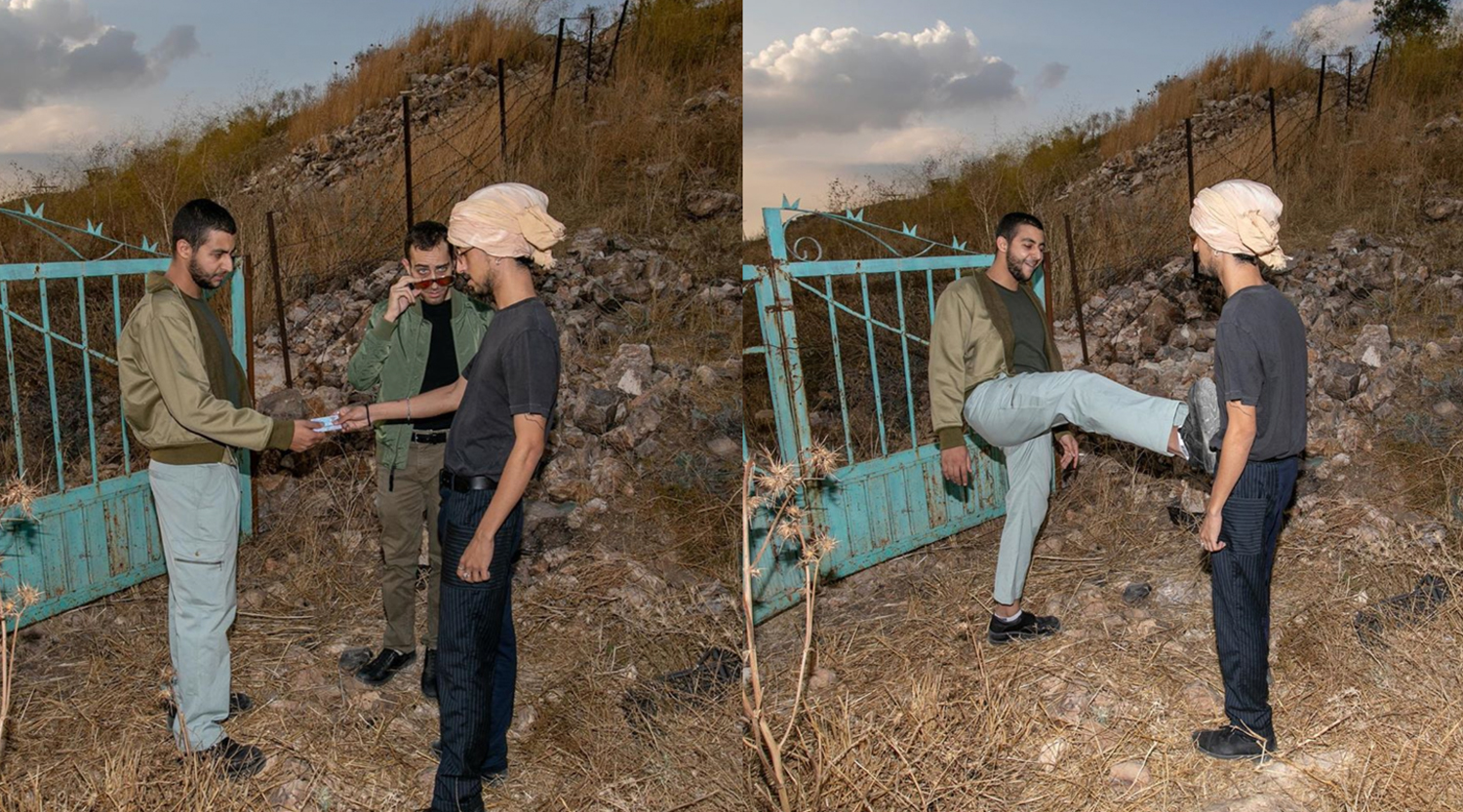In an international music scene full of political overstatements and misrepresentation, independent Palestinian record label BLTNM defy the bullshit and victimisation with their groundbreaking music-making. Defined by their musical identities and nothing else, they’ve resonated strongly across the MENA region — not only growing the Palestinian rap scene, but teaching new ways to flow with creativity and humour. We meet label founders Shabjdeed, Al Nather and Shabmouri to find out more.
Straight outta Kufr Aqab, East Jerusalem: Shabjdeed. With his raw skills, the artist born Abu Othaina was an instant success in the underground Palestinian hip-hop scene, soon catching the attention of local producer Al Nather. Together, they created the dark hip-hop and trap alias Shabjdeed, with the release of their joint full-length debut album Sindibad el Ward this summer marking a milestone for independent Arab music. But who is Al Nather? He’s known as the scene’s veteran, the most discerning ears around. Having mastered dancehall, trap, hip-hop, UK bass and dub — and collaborated with artists like Al Rass, Muqata’a and The Synaptik — the rapper and producer has fast established himself as one of the region’s most respected music producers. And then there’s Shabmouri aka Mukta-Feen, the audio engineer/visual artist/DJ/producer in-one whose multidisciplinary approach has defined the visual identity of BLTNM, as seen in Boiler Room’s recent documentary, Palestine Underground.
The birth of BLTNM, back in 2016, was the result of friends thrust together by a shared passion in their small West Bank city of Ramallah, just north of Jerusalem. “Shabjdeed and Al Nather began making at least three demos a month,” explains Shabmouri. “That energy drove us forward. That idea of collaboration, with the need to work and express ourselves during a time where everything felt in flux”. Drawing from a diverse background of musical influences, the group honed-in on the experimentation that has now become a defining feature of the new wave they’re at the heart of.
Citing Canadian hip-hop channel Melody Hits as an early influence, Shabjdeed re-discovered his love for the genre in 2015, when Shabmouri convinced him to make use of his dark sense of humour and clever wordplay by giving rap a go. “The first tape I ever bought was 50 Cents’ Get Rich or Die Trying when I was 10 years old,” says Al Nather. “When I was 15, I started making electro and playing around with FL Studio. Then I co-founded the Saleb Wahed crew in Ramallah with Dakn, Haykal, Julmud, Shua’, Faragh and MC Riyadiyat — we deconstructed hip-hop to fit our culture.”
Shabmouri chimes in on Saleb Wahed, remembering how their weird and multi-layered beats were different to anything else coming out of their high school at the time. “We listened to Madlib, J Dilla, Busta Rhymes, Wu-Tang, Kool Keith and everything on LA’s Stones Throw Records,” he says. “Ras G and Flying Lotus from Brainfeeder too.” Al Nather discovered trap via Shabjdeed, and together they listened and learned from Metro Boomin, Future and Young Thug. And their collective interests continue to expand, with the team now engrossed in the UK’s drill scene — 67, Unknown T and President T.
It is these obsessive, eclectic listening habits that shape the label’s ever-evolving approach to beat-making and lyrics — notably always in Arabic and often in their local dialect. “All of us feel boxed in by borders and die to meet each other,” says Al Nather, “But through music, Arabs across the region can share an identity. One of the biggest reasons things have changed collectively, is that now we can make music together without even meeting.”
By laying hip-hop and trap foundations, BLTNM are ushering in a second wave — one that is characterised by its diverse soundscape and its ability to traverse borders — and not just through the Internet. While Arab rap has always been localised, this new generation has been hell-bent on breaking down physical borders too, primarily through collaboration and live performances. “The new scene is growing organically,” says Shabjdeed. “You can see rappers filling up both small and big venues in every Arab country.” And that’s where BLTNM are winning — through their extensive travels, they’re quickly becoming known for their legendary parties and DJ sets. “We are the new Palestine,” says Shabjdeed, “Palestine and Palestinians have always been something close to every Arab’s heart and I am proud to bear the responsibility of representing it.”
By actively showing that the best work emerges through collaboration with the existing local and growing regional communities, BLTNM are drawing creatives in the region closer together. As a result, they’re ensuring that people in Palestine and beyond are not only exposed to, but are growing accustomed to, high-quality locally-made music. “Our Palestinian identity is ours to preserve and understand,” Shabmouri says. “It is not for westerners to consume and analyse in order to fill a fetishising void of theirs.” BLTNM know exactly how to cash the cheque, basically, and it’s got nothing to do with the west. In fact, they believe the west often misses what really matters about Arab rap — the music. BLTNM are driven by truth and a set of aims that they all agree on: the output of quality music, growing the culture, creating an industry, inspiring their youth and spreading music throughout the region. “I believe in my people and in our capabilities,” says Shabjdeed. “By continuing BLTNM as it is — a high-quality local music source — we prove to our fellow Palestinians that you can do whatever you want, right here in this ‘semi-country’.”
